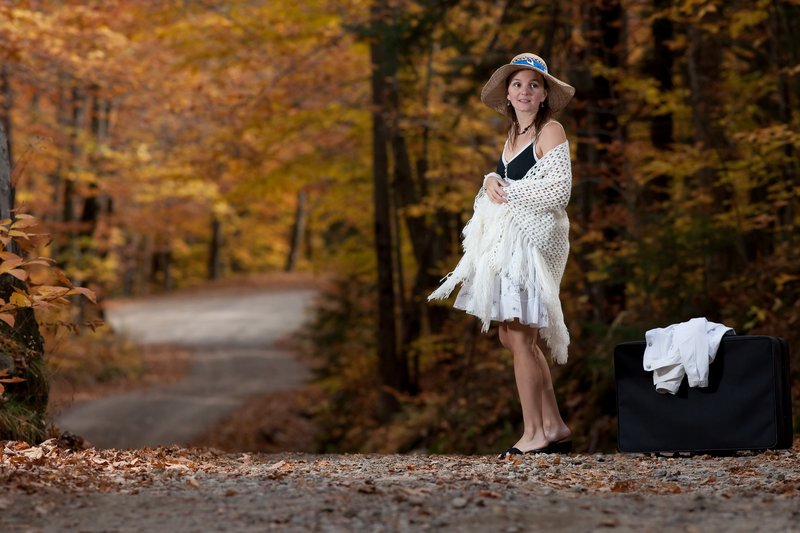Neoclassical pianist Heather Pierson just released her sixth CD, “The Open Road,” consisting of 14 original pieces composed by Pierson and recorded at Baked Beans Recording Studio in Harrison. Pierson was born in Joplin, Mo., but spent her formative years in Maine, and now calls Center Conway, N.H., home. Find her online at heatherpierson.com, where you can purchase “The Open Road.” Pierson recently took time out to talk to GO about the new record, her love of vintage pianos and more.
When did you first start to play the piano?
I got my first piano at age 5. It was a toy that I received for Christmas the first year we were in Maine. It came with a strip of paper of colored squares that went across the keys and a book of songs that were played by “color.” I had learned and memorized all the songs in the book by New Year’s, which made my parents say, “Maybe she’s got a knack for this ” My first real piano came the following year, and it’s been a love story ever since.
What are some of things you like and appreciate about the 1930 Model A Mason & Hamlin piano that you recorded “The Open Road” on?
First and foremost, I love the care and the attention that Alan Bean (owner of Baked Beans Recording Studio) and his wife, Kim, who teaches on that piano, give so freely and lovingly to the instrument. They have spent a tremendous amount of time, money and energy in dedication to restoring and maintaining this beautiful piano. It’s also the same piano on which I recorded all the tracks for “Make It Mine.”
When Bob Ludwig (of Portland’s Gateway Mastering) mastered that album for me, he was so deeply impressed with the sound of the piano that he made an appointment with Alan specifically to see the piano and the studio. I also love the fact that Alan, whom I’ve known for over 20 years now, took great care to give the recording of the piano a darker sound to match that of the Steinways that I typically prefer.
Over what period of time were the songs on “The Open Road” written?
A couple of the “Heartland Songs” were originally composed when I was just a teenager during a trip I took back to Missouri and Kansas. They’ve been revisited and revised for this release. The rest have been composed over the last 10 to 12 years or so since.
What inspires your writing?
Different things inspire different types of writing. For the pieces on “The Open Road” and for that type of composition, I’m inspired very much by the beauty of the natural world. When I’m writing songs with lyrics, I tend to go inward, either to my own personal experience or to reflect on the complexity of human behavior and relationships. I’ll be heading into the studio later this fall to start recording the next project — a collection of Americana/roots/acoustic guitar-driven songs — which will include my song that won this year’s New England Songwriting Contest, “A Hard Man to Please.”
What did you grow up listening to?
I spent a lot of time alone in my room with my headphones on, listening to everything I could get my hands on, and enjoyed it all. I grew up in Hebron, where sometimes I could just barely tune in WRBC (Bates College radio), and was introduced to lots of wild and innovative stuff that way. I’d go through phases — metal, then classical, then punk, then jazz, then electronica, then blues. I bounced around, and I still do. My parents both really loved and enjoyed music too, and we were always listening to something in the house.
Some favorite groups around the house were The Allman Brothers, Eric Clapton, The Beatles and Kansas. Lots of blues-influenced stuff. They liked a lot of folky stuff too, like John Denver. My father really loved Anne Murray’s voice, and my mother was wild about Rod Stewart. Dad also loved jazz, especially Pete Fountain, but those records — and his clarinet — came out usually after Mom went to bed. Some of my fondest memories are of listening to him play along with those scratchy Dixieland records.
When you’re playing, where does your mind tend to go? What’s your emotional state?
My mind tends to empty, and I’m completely focused on the music and on the connection I’m trying to make with the audience. I hesitate to say that it’s a Zen state, but it’s something akin to that. I don’t always get there, but that’s always the goal.
What’s the best part about performing live?
It’s a transcendent experience that is difficult to quantify. I love connecting with people in the audience. One of the best feelings is looking up and making eye contact with someone who is picking up what I’m putting down. Music is a language, to quote Victor Wooten, that doesn’t have to be understood to be effective.
Staff Writer Aimsel Ponti can be contacted at 791-6455 or at:
aponti@pressherald.com
Send questions/comments to the editors.




Success. Please wait for the page to reload. If the page does not reload within 5 seconds, please refresh the page.
Enter your email and password to access comments.
Hi, to comment on stories you must . This profile is in addition to your subscription and website login.
Already have a commenting profile? .
Invalid username/password.
Please check your email to confirm and complete your registration.
Only subscribers are eligible to post comments. Please subscribe or login first for digital access. Here’s why.
Use the form below to reset your password. When you've submitted your account email, we will send an email with a reset code.